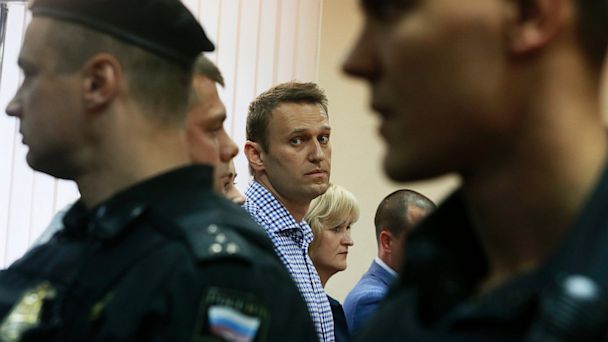Putin Critic Alexei Navalny Gets 5 Years for Embezzlement

(Image Credit: Dmitry Lovetsky/AP Photo)
MOSCOW - Anti-corruption crusader Alexei Navalny, the most prominent critic of Russian President Vladimir Putin, was convicted of embezzlement today in what he had denounced as a political show trial.
Navalny was sentenced to five years in prison and given a large fine. He and a co-defendant, sentenced to four years, were handcuffed in court and led away.
He can appeal but, according to Russia's Interfax news agency, he has already withdrawn his candidacy for mayor of Moscow in September's election.
Unsanctioned protests in response to the verdict are scheduled for tonight in towns across the country. More than 7,000 people have already RSVP'd for the one in Moscow.
Navalny, 37, was accused of embezzling half a million dollars of timber in the provincial capital of Kirov, near Moscow. He insisted the charges are fabricated and politically motivated.
Washington considers Navalny's trial to be politically motivated and expressed disappointment with his conviction.
"We are deeply disappointed in the conviction of Navalny and the apparent political motivations in this trial," U.S. Ambassador to Russia Michael McFaul tweeted today.
The court was packed with journalists awaiting the verdict. The U.S. Embassy sent an observer and the U.S. ambassador tweeted Navalny to say he was watching the live feed online.
The judge read the entire verdict at almost a near whisper for three hours. Navalny had to stand and defiantly tweeted throughout the entire proceeding. By the time the judge had finished, police in Moscow had sealed off a square where supports planned to gather in the evening.
Navalny's trial was arguably the most prominent against a potential challenger in the Putin era, certainly the most since the trial of former Yukos Oil chief Mikhail Khodorkovsky a decade ago put Russia's richest man in jail after he announced plans to enter politics.
That the father of two would be found guilty today was almost never in doubt. The presiding judge had never found anyone not guilty. Conviction rates nationwide exceed 99 percent. In a country with no judicial independence, a political headache like Navalny stood no chance.
The question was what his sentence would be. In other words: Did the Kremlin consider Navalny more dangerous in jail or out? Would throwing him in prison just give him more publicity?
Navalny's political career is now over before it could really begin. He can never run for office with a criminal record.
Navalny had registered Wednesday as a candidate for Moscow mayor in September's snap election. The incumbent mayor resigned unexpectedly earlier this year and is running again, a sign analysts say that the Kremlin expects things to get worse here.
Navalny was polling way behind, but Moscow was the only major city in Russia to vote less than 50 percent for Putin during last year's presidential election. His candidacy gave hope to the city's battered opposition.
Navalny rose to prominence several years ago exposing fraud and government corruption on his blog. When street protests against Putin began in December 2011 amid evidence of fraudulent parliamentary elections, his moment had arrived.
Navalny did not start the protests, but he was the closest thing they had to a unified leader. They were, and remain, an uneasy alliance of liberals, communists and racist nationalists. Navalny himself has expressed some nationalist views.
He branded the protests. His slogan of "crooks and thieves" became a rallying cry against the ruling United Russia party, and his passionate speeches were one of the few everyone stopped to hear.
He was one of the few people to break through Russia's rigid political structures to challenge Putin from the outside, mainly using his popular website and huge social media following.
Navalny's conviction comes amid what one author recently dubbed Russia's "generalized climate of fear." Other protest leaders are also under investigation - their homes raided, some put under house arrest. Prominent liberals have fled the country after being investigated for what they see as political witch hunts. Foreign-funded NGOs are essentially being forced to declare themselves spies. Political rallies, speaking about homosexuality, offending religious believers, and even posting some material online are now subject to new restrictions.
In his closing remarks to the court earlier this month, Navalny vowed to continue holding the Kremlin accountable and blasted the country's leadership.
"All these people who are building this feudal regime, having seized the power, all these KGB generals who planted their children in banks, all these United Russia deputies who sent theirs to Switzerland and opened bank accounts there - whole settlements in Marbella belong to Uni-Russians," he said. "We shall destroy this feudal society that is robbing all of you."